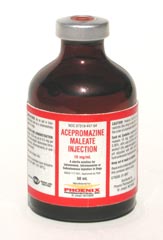
Product Description: Acepromazine is a tranquilizer and a pre-anesthetic for use in horses. It does not prevent the horse from feeling pain.
Indications for Use: This product can be administered as a pre-medication prior to surgery or be used during minor procedures (teeth floating, suturing injuries). It can also be used to sedate an animal prior to traveling.
Dosage and Administration: Intravenous and intramuscular administration is recommended at a dose of 2-4 mg per 100 pounds of body weight. This dose can result in marked sedation and can cause the animal to stumble and be incoordinated. Acepromazine can have some very severe side effects in some animals. Because of this, the dose for each animal can be very different and should be modified to fit each animal and the desired depth of tranquilization. When doing very minor procedures such as clipping, doses of 0.5-1 mg per 100 pounds of body weight will often provide some sedation and still leave the horse with adequate muscular coordination.
There is an oral form of a drug similar to acepromazine called promazine hydrochloride (Promazine granules). This product comes in a granule form that can be given along with the horse’s food. A dose of 0.45-0.9 mg of promazine hydrochloride per pound of body weight is recommended.
Precautions and Side Effects: In adult male horses, acepromazine will normally cause the penis to relax and drop out of the sheath. In rare occasions, acepromazine can cause irreversible paralysis of the retractor penis muscle in male horses (mostly stallions). Because of this, extreme caution should be used when administering this product to male horses, especially stallions.
Packaging: The injectable products come in a 10 mg/mL concentration. The granules come in a 10.25 oz container.
Storage: Keep at a controlled room temperature and out of direct sunlight.
Drug Type: Rx
Manufacturer: Ft. Dodge, Vedco, Vetus, Boehringer Ingleheim, Butler, plus others
